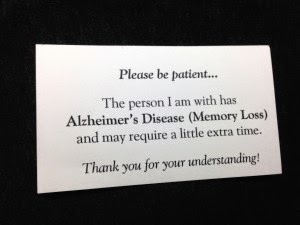Travel Guidelines For People With Cognitive Impairment
People with dementia have ever-increasing trouble with changes of pace, changes in location, fatigue, groups of people, changes of time zone, and noise. In a familiar environment, there are many environmental cues that help a person with dementia to remain moored in reality. A favorite chair, a well-learned TV control, and a familiar floor plan are taken for granted.
Unfamiliar places, however, lack these well-known moorings and result in increased confusion, anxiety, and fear. Even places that once were familiar, such as a winter home, can seem new or alien, triggering fear or anger. Caregivers who are planning to travel need to plan trips carefully in advance, using both travel and healthcare professionals to determine the best possible methods to cause the least distress to your loved one. The following guidelines have been developed to assist you with travel planning to ensure a more successful trip.
Assess Care Receiver’s Limitations and Strengths
What are the care receiver’s limitations and strengths?
As a general rule, the more advanced the disease, the more difficult travel will be. For example, care receivers who are still relatively independent and care for themselves will have fewer problems with travel than someone who requires direction to bathe and change their clothing. Also, people with behavioral problems such as paranoia or delusions (missed perceptions, fears, or fixed false beliefs or thoughts) have a more difficult time even when intellectual skills are relatively good.
As another rule, someone who requires assistance with bathing, changing clothing, dressing, and toileting will have significant difficulty even with short, simple overnight trips. At times when it may be easier for retired people to visit adult children who work, it may be better to have the children visit you—even if it means paying for their travel.
Avoid Overnight Travel with a Care Receiver if…
Care receivers who exhibit any of the following behaviors should avoid overnight travel unless in an emergency:
- Become physically or verbally aggressive
- Missed perceptions, have paranoid thoughts, hallucinations, or delusions (for example, think people steal from them)
- Become confused during or after social outings
- Wake at night confused
- Have poorly managed incontinence (or who require special assistance or equipment with feeding if public dining rooms must be used)
- Have episodes where they do not recognize their caregiver
- Fall
- Yell, scream, or cry spontaneously
- Resist or argue with their caregiver’s directions
- Wander or pace
- Demand to leave social settings or restaurants early
- Are easily frightened, confused or agitated
- Are unable to communicate their needs to others
- Have unstable medical conditions
Assess the Caregiver's Limitations.
There are also caregiver-related issues to be considered. Caregivers should avoid traveling with their impaired person if they (the caregiver) have any of the following characteristics:
- Become upset or can not manage well during a crisis
- Are embarrassed when their loved one acts out or does something embarrassing
- Have unstable or complicated health problems
- Are embarrassed to go into an opposite sex restroomsto supervise their loved one
- Are unable to manage in high stress situations or with little sleep
- Insist on maintaining strict honesty and argue with their loved one about mistakes and missed perceptions
- Are not able or willing to make significant adaptations during the trip—often at a moment’s notice—to meet their loved one’s changing needs, including canceling the travel mid-trip.
- Don’t think they want to take the trip but will do it for their loved one
- Think there will be no change in their loved one’s behavior during the trip
- Are not willing to plan well in advance.
- Resist seeking help as needed, thinking they can manage on their own.
- Think that trips to familiar places (such as an adult child’s home or cabin) will be ‘just like it used to be’ because it’s ‘familiar and fun.’
Assess the Emergency and Medical Services Available and Additional Meds Needed
As a caregiver, ask yourself:
- What can be done in case of emergency?
- Do you know of medical services in the areas you travel to?
- Do you need to take special medications with you in case of agitation?
Advise Accomodations and Guests of Impairment and Needs in Advance
Advise hotels, airlines, tour operators, or people you are visiting that you are traveling with someone with memory impairment. Be specific about your safety concerns and special needs. If you are staying in a private home, guest home, or bed and breakfast, do not surprise your overnight host with your loved one’s condition. Explain it fully, well in advance. Do not think they won’t notice. Don’t be upset if they feel they cannot handle the visit—especially if there are children in the home.
- Never travel without a full set of reservations.
- Always provide family members with an itinerary and call home regularly.
- Make a list of the daily routine and special items you need to take with you.
- Always have the person with memory loss identified, preferably with a bracelet your loved one cannot misplace.
- Use good judgment when telling your loved one about the trip. Discussing it too far in advance may produce anxiety and agitation.
- Be flexible. Have a contingency plan that allows you to leave early if your loved one becomes ill, agitated, or wants to go home.
- Keep your sense of humor and laugh at all the things that happen. They will be part of a wonderful memory of your travels together.
- If the trip is prolonged, develop a list of medical professionals and Alzheimer’s Association chapters along your route.
- Never leave your loved one alone or ask strangers to watch him/her. A person who does not know your loved one or the disease will not know how to react in a difficult situation.
- Avoid traveling at peak travel seasons such as Thanksgiving and Christmas
- Take medications with you to manage stomach upset, diarrhea, or other temporary problems caused by changes in food and water.
- Know how to get help and who can help in countries where you do not speak the language.
- Search the internet or check the Yellow Pages to see if there is a travel agent in your area specializing in planning trips for people with disabilities. If so, use the specialized service.
The Trip
While travel may be enjoyable, getting to your destination is generally not relaxing. The following are principles to consider when planning the trip:
- The process of ‘getting there’ should be as short and simple as possible. Plan a trip that involves as few changes as possible.
- Trips should be to a single destination, rather than a series of visits. For example, you would want to travel to a wedding and home, but not take three months stopping at friends’ homes along the way.
- Stick with the familiar. Vacation in ways your loved one was accustomed to before the onset of the disease.
- Consider a shorter trip. Day or weekend trips may be a better alternative, particularly if you are unsure of your loved one’s reaction to travel. If everything goes well, go for a longer visit.
- If your loved one has not traveled in six months, schedule a ‘trial’ overnight stay nearby home to see if your loved one can still tolerate travel.
- Gather necessary papers and documents, including insurance cards, passports, physician’s phone number, medication refills, and the care receiver’s medical record. Do not expect your loved one to carry these documents or tickets.
- Rest periods should be built into the travel schedule.
- Planning too many activities, such as meals in a restaurant, can lead to late night confusion or agitation.
- Do not plan activities for the night you arrive.
- Save travel for your loved one’s best time of day.
- Use services specifically designated for people with disabilities.
- Spend as little time as possible in areas with large groups of more than 20 people, loud noises, or lots of activity (for example, airport gate areas). Avoid busy places and situations that will cause anxiety for your loved one.
- Never expect the person with dementia to travel alone. Do not expect travel employees (flight attendants, gate personnel) to care for or supervise your loved one. Always have the care receiver carry identification.
- Expect your loved one to become more confused, agitated, or behaviorally difficult during the trip. Assist with menus and choices.
- Do not expect other members of a tour to volunteer or be agreeable if you need help with your loved one.






























